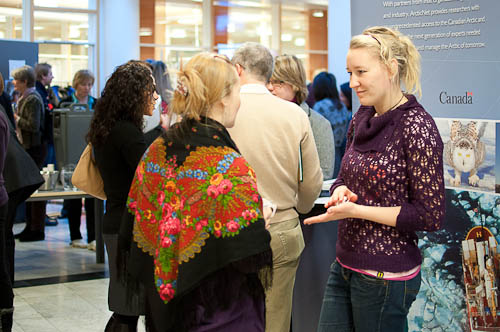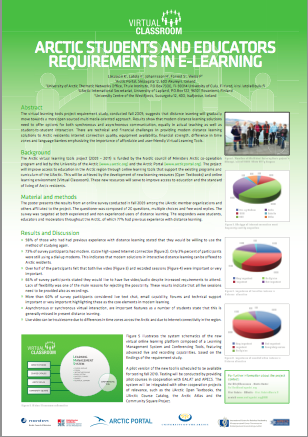 Arctic Frontiers Conference 2010 in Tromso, Norway was the 4th international Arctic meeting platform for stimulating and motivating pan-Arctic integration. This year's Arctic Frontiers theme was "Living in the High North", and had special focus on challenges to the development of sustainable communities.
Arctic Frontiers Conference 2010 in Tromso, Norway was the 4th international Arctic meeting platform for stimulating and motivating pan-Arctic integration. This year's Arctic Frontiers theme was "Living in the High North", and had special focus on challenges to the development of sustainable communities.
The Conference is traditionally divided in to two sections; Policy section and Science section. This years Policy section had two sessions concentrating on Changes in strategies for the Arctic and Sustainable communities in the Arctic. The Science section was on the other hand divided in to four parts, each part representing different aspects affecting Arctic communities. Part I dealt with changes in ice and snow on land, in the seas, and in the ground (the cryosphere) and the distribution of Earth ?s heat and water. Part II concentrated on sustainable communities in the north focusing on the themes of economy, self-governance, well-being and health, while Part III covered issues on changing Marine Biodiversity in the Arctic.
This years Part IV was of special interest of the Arctic Portal and its partners, the session dealing with E-learning in the High North. The aim of the E-learning part of the conference was to exchange knowledge and research about E-learning in the Arctic communities and regions and specify the learning processes, pedagogy, and appropriate information technologies relevant to distant learners in these communities.
 The Arctic Portal together with the University of the Arctic, University Centre of the Westfjords, International Centre for Reindeer Husbandry and Association of Polar Early Career Scientists is developing an online system that supports distance learning in the Arctic. This so called Virtual Classroom will be a virtual learning solution with a two-way communication between the teacher and students with open discussions and capabilities for classroom participation and real-time interaction. The Virtual Classroom will be accessible from any computer, giving that way inhabitants of small rural communities an opportunity to study without having to relocate to larger communities with traditional distance learning equipment / schools.
The Arctic Portal together with the University of the Arctic, University Centre of the Westfjords, International Centre for Reindeer Husbandry and Association of Polar Early Career Scientists is developing an online system that supports distance learning in the Arctic. This so called Virtual Classroom will be a virtual learning solution with a two-way communication between the teacher and students with open discussions and capabilities for classroom participation and real-time interaction. The Virtual Classroom will be accessible from any computer, giving that way inhabitants of small rural communities an opportunity to study without having to relocate to larger communities with traditional distance learning equipment / schools.
The Arctic Portal, together with other project partners, participated in the Arctic Frontiers Part IV poster session introducing results from their user requirement survey conducted in fall 2009. The survey examined the needs and requirements of students and educational staff in UArctic member institutions, providing the project group as well the Arctic Frontiers a valuable information on how the users of theses systems experience current technology and pedagogical preferences.
The main outcomes of the survey were that a real time interaction with the teacher and other students is highly appreciated. Many students felt that one of the downsides of distance learning is the lack of real time interaction within the class. In addition, many people thought that an access to a recorded lectures was highly preferable to enhance the learning experience. On the other hand, many students expressed their satisfaction with the contemporary distance learning arrangements, since it gave them an opportunity to organize their time and studies as they preferred independent of the schedule of the school.
To learn more about the Virtual Learning project, please visit the homepage of the project
